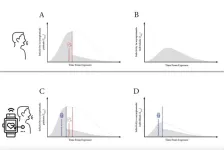(Press-News.org) Worldwide obesity rates have more than doubled since 1990, with nearly a billion people now falling into the category. Though a complex interplay of genes, diet, and environment contribute, 90% of cases share one thing in common: leptin resistance.
In lean individuals, fat cells produce the hormone leptin, which suppresses appetite. But in most individuals with obesity, this signal fails to register. Why this happens has been a mystery for more than three decades, ever since Jeffrey M. Friedman’s laboratory at the Rockefeller University cloned the leptin gene in 1994.
But now Bowen Tan, Kristina Hedbacker, and other researchers in Friedman’s Laboratory of Molecular Genetics have discovered a neural mechanism involved in leptin resistance—and, crucially, a way to reverse it in mice using a well-known drug. As the researchers describe in a new paper in Cell Metabolism, the drug rapamycin restores leptin sensitivity to diet-induced obese mice, leading to significant loss of fat with only minimal effects on muscle.
“Before our research, the cause of obesity in diet-induced obese mice was unknown, leaving a critical gap in our understanding of how leptin resistance develops and how it can be reversed,” says Tan, co-first author and a graduate student in Friedman’s lab.
“Even though Jeff Friedman discovered this powerful hormone back in 1994, its full potential to help people lose weight hasn’t been realized because most obese patients have acquired resistance to leptin,” says co-first author Hedbacker, a research specialist at HHMI and a member of Friedman’s lab. “It’s really exciting to think that there may be means for addressing this.”
Too much of a good thing
Long before plant agriculture and animal domestication provided more reliable access to nutrients, humans routinely faced starvation. That’s when the leptin circuit evolved. Neurons in the hypothalamus—the brain’s energy-balance regulator—pick up satiety signals from fat, which secretes leptin; a high amount of the hormone signals that there are adequate fat stores and the energy tank is full, while a low leptin level indicates that the body is running on fumes.
Our brains retain this system for regulating food consumption, even as conditions around it have drastically changed, with more people having access to high-calorie foods than ever before. Data suggest that as weight is gained and leptin levels continually rise, the brain gradually stops responding to leptin.
“This phenomenon is analogous to insulin resistance, which is the most common cause of diabetes and a condition that develops over time, due, in part, to chronically elevated insulin levels,” Hedbacker says. “Similarly, most people with obesity have high leptin, but reception of their leptin signaling is blocked. This makes it very difficult to lose weight, because the brain does not receive the appropriate signal of how much fat is stored.”
With this in mind, Tan and Hedbacker set out to identify biomarkers in the 10% of patients with obesity who are leptin sensitive and could potentially benefit from leptin treatment. They looked in both leptin-sensitive and leptin-resistant mice.
What they discovered sent them down an unexpected path. They found that in leptin-resistant mice, the levels of two essential amino acids are dysregulated in response to leptin. These two amino acids, methionine and leucine, are known activators of a signaling molecule called mTOR (short for “mammalian target of rapamycin”). Leptin-sensitive animals showed no such dysregulation.
“With this as a starting point, we found that mTOR is hyperactive in specific brain regions and cell types in obese animals,” Tan says.
Weight loss
To investigate further, the researchers tested the effects of rapamycin, an mTOR inhibitor, in four groups of mice: leptin-sensitive mice fed a low-calorie chow diet, mimicking people who remain lean; mice fed a high-fat diet that developed leptin resistance, similar to people who develop obesity; and two sets of obese mice that were leptin deficient but responsive to the hormone. These mice were fed either the low-calorie chow diet or the high-fat diet.
The results were striking: “Obese mice fed a high-fat diet and treated with the mTOR inhibitor rapamycin lost significant amounts of weight, which—similar to leptin treatment in leptin-sensitive animals—was primarily due to a decrease in the amount of adipose tissue,” Tan says.
Loss of fat mass without muscle mass is characteristic of leptin treatment, but it’s unusual for weight loss in general. For example, weight loss achieved by dieting or treatment with highly effective anti-obesity medications such as Ozempic leads to a significant loss of both fat and muscle.
They then investigated which cell types in the brain were the target of rapamycin, focusing on a dozen cell types in the hypothalamus, where leptin is known to act. Using single-cell sequencing, Tan found that rapamycin treatment exerted significant effects on neurons in the hypothalamus that express a gene known as POMC. These neurons are known to mediate leptin’s weight-reducing effects.
“We found that rapamycin reduced mTOR in POMC neurons and restored their receptivity, essentially resensitizing the animals to leptin and leading to a decreased size of fat depots relative to muscle mass,” Hedbacker says.
Defects in POMC-expressing neurons are also known to cause leptin resistance and obesity, Friedman notes, adding, “it was satisfying to find that an acquired form of leptin resistance targets this same pathway.”
By showing that is possible to restore leptin signaling, the findings could potentially lead to new obesity treatments. Future research in Friedman’s lab will explore why a high-fat diet elevates mTOR signaling in the brain. The lab will also try to develop means for inhibiting mTOR specifically in POMC neurons to avoid potential side effects of systemic rapamycin use, which is linked to glucose intolerance and potentially diabetes.
END
Researchers discover a cause of leptin resistance—and how to reverse it
2025-03-04
ELSE PRESS RELEASES FROM THIS DATE:
Heat from the sun affects seismic activity on Earth
2025-03-04
WASHINGTON, March 4, 2025 – Seismology has revealed much of the basics about earthquakes: Tectonic plates move, causing strain energy to build up, and that energy eventually releases in the form of an earthquake. As for forecasting them, however, there’s still much to learn in order to evacuate cities before catastrophes like the 2011 magnitude 9.0 Tōhoku earthquake that, in addition to causing a tsunami that led to the Fukushima nuclear disaster, resulted in more than 18,000 deaths.
In recent years, research has focused on a possible correlation between ...
Postoperative aspiration pneumonia among adults using GLP-1 receptor agonists
2025-03-04
About The Study: This cohort study found no significant association between the preoperative use of glucagon-like peptide-1 receptor agonists (GLP-1 RAs) and short-term postoperative aspiration pneumonia despite growing concerns about the adverse effects of these medications after surgery. This finding suggests that it may be beneficial to reassess the preoperative withholding guidelines for GLP-1 RAs.
Corresponding author: To contact the corresponding author, Eric L. Smith, M.D., email esmith@nebh.org.
To access the embargoed study: Visit our For The Media website at this link https://media.jamanetwork.com/
(doi: 10.1001/jamanetworkopen.2025.0081)
Editor’s ...
Perceived discrimination in health care settings and care delays in patients with diabetes and hypertension
2025-03-04
About The Study: The findings of this study suggest that higher perceived discrimination in health care settings is positively associated with delaying health care due to nervousness about seeing a health care professional. The largest mediation proportion observed was among younger adults and racial and ethnic minority groups. By prioritizing better patient-clinician communication, health care delays associated with patient apprehension related to perceived discrimination may be reduced.
Corresponding author: To contact the corresponding author, Maryam Jafari Bidgoli, ...
Postoperative outcomes following preweekend surgery
2025-03-04
About The Study: In this retrospective multi-institutional study, patients who underwent surgery immediately preceding the weekend had a significantly increased risk of complications, readmissions, and mortality compared with those treated after the weekend. Further study is needed to understand differences in care that may underpin these observations and ensure that patients receive high-quality care regardless of the day of the week.
Corresponding author: To contact the corresponding author, Raj Satkunasivam, M.D., ...
Nearly 4 of 10 Americans report sports-related mistreatment
2025-03-04
Nearly 40% of adult Americans say they’ve experienced some type of sport-related mistreatment in their lives, a new study shows.
Mistreatment ranged from psychological and emotional to physical and sexual. But most people who reported mistreatment experienced more than one kind, the research found.
And one-third of those who never even played organized sports reported sports-related mistreatment.
“Many people talk about how they hated middle school or high school because of recess or gym class and the abuse or shame they felt playing sports in that environment,” said Chris Knoester, co-author of the study and professor of sociology ...
School absence patterns could ID children with chronic GI disorders, research suggests
2025-03-04
Children who frequently miss school because of abdominal complaints are far more likely to be suffering from disorders of the gut-brain axis such as irritable bowel syndrome than diseases that can be detected with medical tests, new UVA Health Children’s research has found. The discovery could improve care for children with these common GI disorders and might spare them from a barrage of unproductive tests.
UVA’s Stephen M. Borowitz, MD, and fourth-year medical student Seth M. Tersteeg looked at school absenteeism as reported by parents who brought their children to UVA Health Children’s Pediatric Gastroenterology Clinic. Children who had missed more ...
Mount Sinai researchers identify molecular glues that protect insulin-producing cells from damage related to diabetes
2025-03-04
Researchers from the Icahn School of Medicine at Mount Sinai in New York have discovered a novel approach to protecting insulin-producing beta cells from the damaging effects of glucolipotoxicity—a harmful condition linked to the progression of type 2 diabetes (T2D). These findings, published on March 2, 2025 in Nature Communications, could lead to promising treatments targeting beta cell dysfunction.
For patients, this research could lead to new treatments that protect the insulin-producing cells in the pancreas, potentially ...
Study: Smartwatches could end the next pandemic
2025-03-04
Everyday smartwatches are extremely accurate in detecting viral infection long before symptoms appear — now, research shows how they could help stop a pandemic before it even begins.
Early detection of sickness is critical for preventing its spread — whether it’s COVID-19, influenza or the common cold. Yet, many illnesses are at their most contagious before people even know they’re sick. Research shows that 44 percent of COVID-19 infections were spread several days before the sufferer came down with symptoms.
Now, researchers at Aalto University, Stanford University and Texas A&M, have released a study that models how smartwatches ...
Equal distribution of wealth is bad for the climate
2025-03-04
Both the UN and several Nobel laureates have said that political and economic inequality is a driver of high carbon emissions.
The argument is that more democratic societies – where wealth, power and opportunities are more evenly distributed – are better at reducing their emissions.
But that is not true – quite the opposite.
“Some people hold that a rich power elite stands in the way of climate action, and that democracies can more easily implement measures such as banning emissions or raising taxes,” said Professor Indra de Soysa from the Norwegian ...
Evidence-based strategies improve colonoscopy bowel preparation quality, performance, and patient experience
2025-03-04
EMBARGOED FOR RELEASE
Tuesday, March 4, 2025 at 9:00 am Eastern Time
An advanced copy of the full recommendation is available upon request.
Media Contacts
American College of Gastroenterology
Becky Abel mediaonly@gi.org (301) 263-9000
American Gastroenterological Association
Annie Mehl communications@gastro.org (301) 272-0013
American Society for Gastrointestinal Endoscopy
Andrea Lee alee@asge.org (630) 570-5601
North Bethesda, MD; Bethesda, MD; and Downers Grove, IL (March 4, 2025) ...



